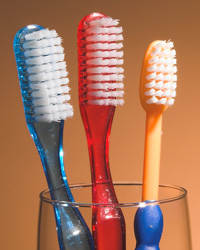Are Your Teeth Temperamental? Dealing With Sensitive Smiles
Are you overly sensitive? Relax, it has nothing to do with crying during life insurance commercials. Millions of adults struggle with hypersensitive teeth, which means they are sensitive to hot and cold temperatures, very sugary or acidic foods and drinks and vigorous tooth brushing. This kind of sensitivity is often called "dentin hypersensitivity."
Dentin is the tissue that makes up the core of each tooth. Above the gum line, dentin is protected with a coating of enamel. Unfortunately, as enamel is worn away or decayed, dentin becomes exposed and receptive to sensations that cause painful nerve responses. This can also occur as the result of receding gums, a common symptom of gum disease.
So, what causes sensitive teeth? A number of things may be to blame. Over-zealous brushing with a firm bristled tooth brush or abrasive toothpaste can lead to dentin hypersensitivity, as can gum disease, which is the result of poor brushing and flossing habits. Your diet may also play a role, as frequent consumption of acidic foods and drinks can chemically dissolve tooth enamel. Finally, abnormal wear on tooth surfaces from chronic clenching or grinding of teeth, nail biting and chewing on hard objects can lead to sensitive teeth. To avoid the problem, brush and floss daily to maintain healthy gums and protect dentin from exposure. Avoid vigorous tooth brushing with a hard-bristled toothbrush.
If you're already suffering from overly sensitive teeth, your best bet is to contact your dentist for guidance on dental hygiene. In the mean time, there are products that can help. Desensitizing toothpaste used in conjunction with a soft-bristled toothbrush can help. Toothpaste designed for those with sensitive teeth can reduce the pain associated with the condition after only a few days of use.

+Jim Du Molin is a leading Internet search expert helping individuals and families connect with the right dentist in their area. Visit his author page.
Plaque Control Toothpastes: Good Preventative Dentistry?
The marketers of toothpastes have come up with a new spin that will work on your teeth – toothpaste that helps prevent plaque. Since most American consumers are now aware of oral hygiene and the threat of gum disease, toothpaste manufacturers and marketers have spent upwards of $77 million to sell anti-plaque and tarter control home care products. The media blitz in the dentistry world is on.
Dentists have always known that plaque is the cause of gum disease. And plaque will eventually contribute to the formation of tarter on your tooth. But if you use these new toothpastes, will they work.
Crest and Colgate and other major brands have added a substance that seems to slow the accumulation of tartar on the tooth. You can try it and see for yourself if it works.
But the bottom line for many dentists would be to make sure you're brushing right, no matter what toothpaste you use. A new group of bacteria forms on a tooth every 24 hours, so the object of brushing is to disrupt these colonies. Dental hygiene includes: good tooth brushing techniques, a learned skill that takes practice. However, even the most determined brushing won't always get rid of debris beneath the teeth.
That's why an annual dental cleaning and refresher course on brushing and flossing should bring you up-to-date on the oral health front. And what about those new toothpastes? Can't hurt. Call your dentist today.

+Jim Du Molin is a leading Internet search expert helping individuals and families connect with the right dentist in their area. Visit his author page.







